This article needs additional citations for verification .(May 2022) |
Khan Klub is a boutique hotel in Peshawar, Pakistan. [1]
This article needs additional citations for verification .(May 2022) |
Khan Klub is a boutique hotel in Peshawar, Pakistan. [1]
The hotel is housed in a restored Hindu haveli that was built in 1793 by the Howrah family and is owned by Bashir Ahmed Awan. [2] It was opened on November 3, 1995 by Irish-American Martin Jay Davis (known as Ashley), who designed and spent one year renovating the haveli with 76 refugee master artisans from Afghanistan. All fixtures, furniture and artwork were produced by Afghan refugees and Pakistani craftsmen. The haveli was restored by Davis in order to promote cultural understanding in Peshawar of the importance of heritage preservation and the promotion of the arts. Davis spent 13 years in Peshawar (between 1990-2003) promoting and preserving the arts of Afghanistan and Pakistan's Khyber Pakhtunkhwa province.[ citation needed ]
There are 8 rooms in the hotel, each named after gemstones mined in Afghanistan and Pakistan: lapis lazuli, spinel, morganite, tourmaline, topaz, peridot, ruby, and garnet. The restaurant is designed on the pattern of a traditional Pashtun hujra with traditional bajotes (small sitting level dining tables), filigreed brass lanterns, garnet floors and handmade carpets. Lapis room has genuine lapis lazuli tiles that were made by the celebrated Afghan jeweler, the late Naib-ud-din. The library and all public rooms are tiled with almandine garnet in marble. Morganite room is tiled in morganite crystals imbedded in marble. The entrance doors to the Khan Klub and guest rooms have original stained glass windows that were produced in Murshidabad (India) in the late 18th Century. The main structure of the hotel, as well as carved jharokas (decorative façades) and jalis (filigreed panels), are also made from wood of giant Himalayan cedar.[ citation needed ]

Khyber Pakhtunkhwa, formerly known as North West Frontier Province (NWFP), is a province of Pakistan. Located in the northwestern region of the country, Khyber Pakhtunkhwa is the fourth largest province of Pakistan by land area and the third-largest province by population. It is bordered by Balochistan to the south; Punjab, Islamabad Capital Territory, and Azad Kashmir to the east; and Gilgit-Baltistan to the north and northeast. It shares an international border with Afghanistan to the west. Khyber Pakhtunkhwa has a varied geography of rugged mountain ranges, valleys, rolling foothills, and dense agricultural farms.

Peshawar is the capital and largest city of the Pakistani province of Khyber Pakhtunkhwa. It is the sixth most populous city of Pakistan, with a district population of over 4.7 million in the 2023 census. It is situated in the north-west of the country, lying in the Valley of Peshawar. Peshawar is primarily populated by Pashtuns, who comprise the second-largest ethnic group in the country.
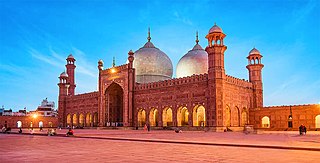
Lahore is the capital and largest city of the Pakistani province of Punjab. It is the second largest city in Pakistan, after Karachi, and 26th largest in the world, with a population of over 13 million. Located in central-eastern Punjab, along the River Ravi, it is the largest Punjabi-speaking city in the world. Lahore is one of Pakistan's major industrial, educational and economic hubs. It has been the historic capital and cultural centre of the wider Punjab region, and is one of Pakistan's most socially liberal, progressive, and cosmopolitan cities.

Ancient art refers to the many types of art produced by the advanced cultures of ancient societies with different forms of writing, such as those of ancient China, India, Mesopotamia, Persia, Palestine, Egypt, Greece, and Rome. The art of pre-literate societies is normally referred to as prehistoric art and is not covered here. Although some pre-Columbian cultures developed writing during the centuries before the arrival of Europeans, on grounds of dating these are covered at pre-Columbian art and articles such as Maya art, Aztec art, and Olmec art.

The Lahore Fort is a citadel in the city of Lahore in Punjab, Pakistan. The fortress is located at the northern end of the Walled City of Lahore and spreads over an area greater than 20 hectares. It contains 21 notable monuments, some of which date to the era of Emperor Akbar. The Lahore Fort is notable for having been almost entirely rebuilt in the 17th century, when the Mughal Empire was at the height of its splendor and opulence.

The Walled City of Lahore, also known as the Old City, forms the historic core of the city of Lahore in Punjab, Pakistan. The city was established around 1000 CE in the western half of the Walled City, which was fortified by a mud wall during the medieval era. It is the cultural centre of the Punjab region.
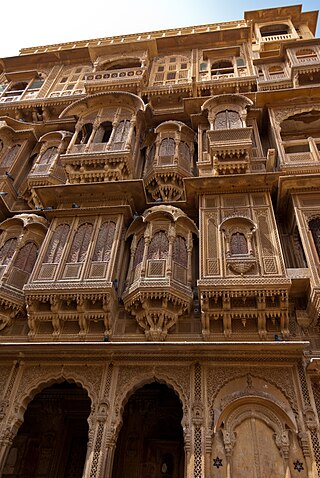
A haveli is a traditional townhouse, mansion, or manor house, in the Indian subcontinent, usually one with historical and architectural significance, and located in a town or city. The word haveli is derived from Arabic hawali, meaning "partition" or "private space", popularised under the Mughal Empire, and was devoid of any architectural affiliations. Later, the word haveli came to be used as a generic term for various styles of regional mansions, manor houses, and townhouses found in the Indian subcontinent.

Tomb of I'timād-ud-Daulah is a Mughal mausoleum in the city of Agra in the Indian state of Uttar Pradesh. Often described as a "jewel box", sometimes called the "Bachcha Taj" or the "Baby Taj", the tomb of I'timād-ud-Daulah is often regarded as a draft of the Taj Mahal.
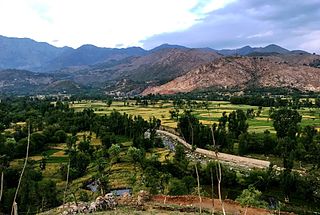
Bajaur District, formerly Bajaur Agency, is a district in the Malakand Division of Khyber Pakhtunkhwa Province, Pakistan. Prior to 2018, Bajaur Agency was the northernmost component of the Federally Administered Tribal Areas (FATA), a semi-autonomous region along the Afghanistan–Pakistan border. In May 2018, FATA was merged into the larger Khyber Pakhtunkhwa Province (KPK) in an attempt to bring stability to the region, redesignating Bajaur Agency to Bajaur District.

The Mahabat Khan Mosque, sometimes spelt Mohabbat Khan Mosque, is a 17th-century Mughal-era mosque in Peshawar, Pakistan. The mosque was built in 1630, and named after the Mughal governor of Peshawar, Nawab Mohabat Khan Kamboh, father of Nawab Khairandesh Khan Kamboh. The mosque's white marble façade is considered to be one of Peshawar's most iconic sights.

The Mullagori or Mulagori or Malagori is a Pashtun tribe present in Khyber District, tribal areas in Khyber Pakhtunkhwa, Pakistan. Historically, they are one of the smallest tribes of ethnic Pashtuns. They are considered as a sub-tribe of Momand Pashtun Ghoryakhel confederacy.

Afghanistan–Pakistan relations refer to the bilateral ties between Afghanistan and Pakistan. In August 1947, the partition of British India led to the emergence of Pakistan along Afghanistan's eastern frontier, and the two countries have since had a strained relationship; Afghanistan was the sole country to vote against Pakistan's admission into the United Nations following the latter's independence. Territorial disputes along the widely known "Durand Line" and conflicting claims prevented the normalization of bilateral ties between the countries throughout the mid-20th century. Various Afghan government officials and Afghan nationalists have made irredentist claims to large swathes of Pakistan's territory in modern-day Khyber Pakhtunkhwa and Pakistani Balochistan, which complete the traditional homeland of "Pashtunistan" for the Pashtun people. Afghan territorial claims over Pashtun-majority areas that are in Pakistan were coupled with discontent over the permanency of the Durand Line which has long been considered the international border by every nation other than Afghanistan, and for which Afghanistan demanded a renegotiation, with the aim of having it shifted eastward to the Indus River. During the Taliban insurgency, the Taliban has received substantial financial and logistical backing from Pakistan, which remains a significant source of support. Nonetheless, Pakistan's support for the Taliban is not without risks, as it involves playing a precarious and delicate game. Further Afghanistan–Pakistan tensions have arisen concerning a variety of issues, including the Afghan conflict and Afghan refugees in Pakistan, water-sharing rights, and a continuously warming relationship between Afghanistan and India, but most of all the Taliban government in Afghanistan providing sanctuary and safe havens to Pakistani Taliban terrorists to attack Pakistani territory. Border tensions between Afghanistan and Pakistan have escalated to an unprecedented degree following recent instances of violence along the border. The Durand Line witnesses frequent occurrences of suicide bombings, airstrikes, or street battles on an almost daily basis. The Taliban-led Afghan government has also accused Pakistan of undermining relations between Afghanistan and China and creating discord between the neighbouring countries.

Afghan art has spanned many centuries. In contrast to its independence and isolation in recent centuries, ancient and medieval Afghanistan spent long periods as part of large empires, which mostly also included parts of modern Pakistan and north India, as well as Iran. Afghan cities were often sometimes among the capitals or main cities of these, as with the Kushan Empire, and later the Mughal Empire. In addition some routes of the Silk Road to and from China pass through Afghanistan, bringing influences from both the east and west.

The Musalla complex, also known as the Musallah Complex or the Musalla of Gawhar Shah, is a former Islamic religious complex located in Herat, Afghanistan, containing examples of Timurid architecture. Much of the 15th-century complex is in ruins today, and the buildings that still stand are in need of restoration. The complex ruins consist of the five Musallah Minarets of Herat, the Mir Ali Sher Navai mausoleum, the Gawhar Shad Mausoleum, and the ruins of a large mosque and a madrasa complex.

The International Peace Belt is a living symbol of the peaceful unity of all nations.
The following is a timeline of the history of the city of Peshawar, Khyber Pakhtunkhwa, Pakistan.
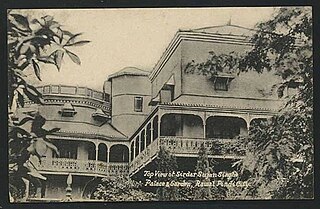
Haveli Sujan Singh, also known as Sujan Singh Haveli, is a haveli located in the congested market of Bhabra Bazar Rawalpindi, Punjab, Pakistan.

The Shrine of Khwaja Abd Allah, commonly called the Shrine at Gazur Gah and the Abdullah Ansari Shrine Complex, is the funerary compound of the Sufi saint Khwaja Abdullah Ansari. It is located at the village of Gazur Gah, three kilometers northeast of Herat, Afghanistan. The Historic Cities Programme of the Aga Khan Trust for Culture has initiated repairs on the complex since 2005.
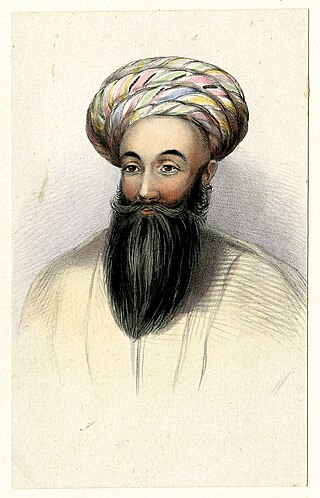
Shah Shujah Durrani was ruler of the Durrani Empire from 1803 to 1809. He then ruled from 1839 until his death in 1842. Son of Timur Shah Durrani, Shujah was of the Sadduzai line of the Abdali group of ethnic Pashtuns. He became the fifth King of the Durrani Empire.
Pathans or the Pathans of India are citizens or residents in India who are of ethnic Pashtun ancestry. "Pathan" is the local Hindavi term for an individual who belongs to the Pashtun ethnic group, or descends from it. The Pathans originate from the regions of Eastern Afghanistan and Northwestern Pakistan, ethnolinguistically known as Pashtunistan.